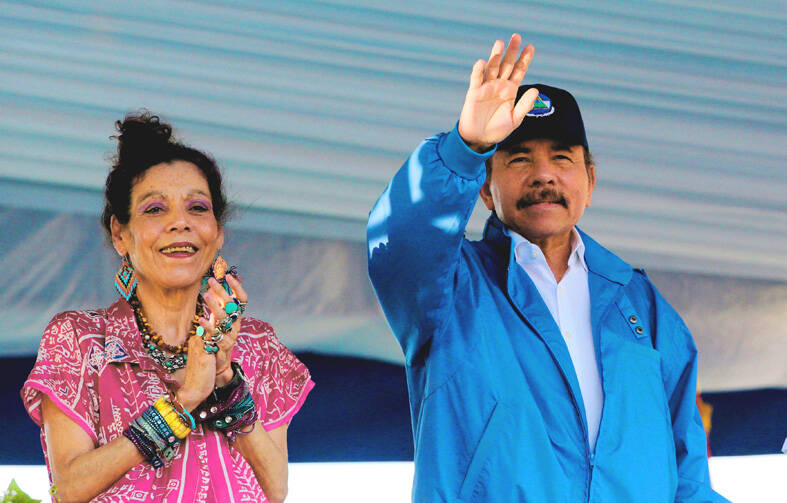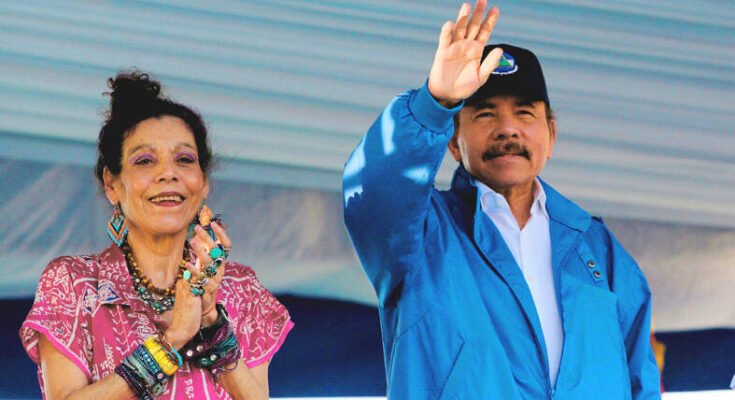‘DICTATORSHIP’: The co-presidency of Ortega and his wife, Rosario Murillo, clears the way for their children to be placed in the line of succession, an opposition figure said
Reuters
The Nicaraguan parliament, dominated by the ruling Sandinista Front, on Friday approved a constitutional reform that hands more power to Nicaraguan President Daniel Ortega and his wife, Vice President Rosario Murillo, as well as the Central American nation’s police and military.
The reform increases the president’s control over the media, extends the presidential term to six years from five, and changes the roles of vice president and president to those of “co-presidents.”
Murillo would now become his co-president. The two have been married since 2005 and she was made vice president in 2017.

Nicaraguan President Daniel Ortega, right, and Vice President Rosario Murillo greet supporters during an event to commemorate the 40th anniversary of the taking of the national palace by Sandinista guerrillas in 1978, in Managua, Nicaragua, on Aug. 22, 2018.
Photo: REUTERS
Ortega has cracked down on dissent over recent years. More than 200 political prisoners were freed early last year and expelled to the US, including five former presidential hopefuls who had been jailed after seeking to challenge the increasingly authoritarian Ortega in a 2021 election.
Under the new reform, the co-presidents would have control over the legislature, judiciary and electoral, public administration, and oversight bodies as well as autonomous entities.
It also mandates that the state would ensure media are not “subject to foreign interests and do not spread false news.”
The reform must pass a second legislative vote next year before becoming law.
Government critics have said the reforms legalize the “absolute power” already exercised for years by Ortega and Murillo.
The Organization of American States, a regional diplomatic body, has said that through the reform Ortega and Murillo intend to “increase their absolute control of the state and maintain their position in power.”
The reform, which 79-year-old Ortega sent to the Nicaraguan Congress on Tuesday “as a matter of urgency,” was approved unanimously by 91 lawmakers.
National Assembly of Nicaragua President Gustavo Porras, confirmed during Friday’s session that the reform would be voted on and approved for a second time on Jan. 10, following Nicaraguan law that says constitutional changes must be approved in two legislative periods.
Porras brushed off criticisms of the reform, calling them “a stupid way of carrying out opposition.”
Dora Maria Tellez, a former Sandinista guerrilla expelled to the US after being jailed in 2021, said that besides giving “constitutional status to everything that the dictatorship has been doing de facto,” the reform was paving the way for Ortega’s succession.
“The co-presidency gives Rosario Murillo total power in Nicaragua, which she will end up assuming when Daniel Ortega is gone,” Tellez said, adding that the co-presidents’ ability to appoint vice presidents “clears the way for the children of the ruling couple to be constitutionally placed in the line of succession.”
UN High Commissioner for Human Rights Volker Turk in a statement said the changes marked a concerning further erosion of checks and balances on executive power.
“If adopted, these changes will sound the death knell for fundamental freedoms and rule of law in Nicaragua,” he said.



